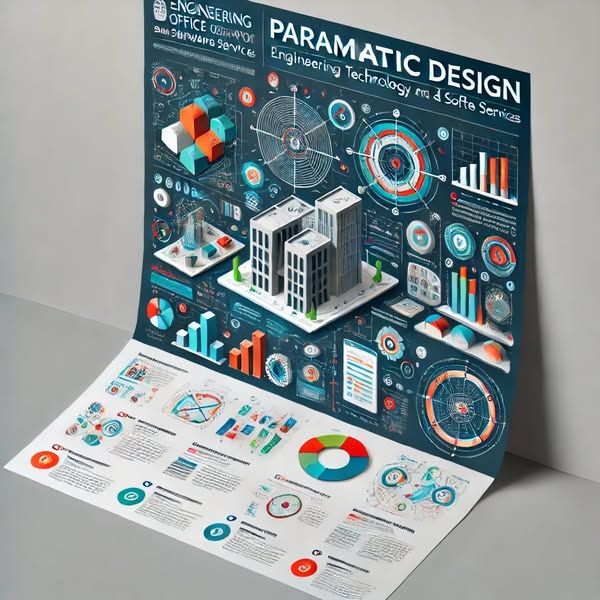
About Course
🧠 Course Title: Parametric Design & Computational Thinking
Course Code: 3015-ARC
Duration: 6 Weeks (18 Hours)
Level: Intermediate to Advanced
Format: Live Sessions + Practical Workshops + Project-Based Learning
Language: English
Tools Used: Rhino, Grasshopper, Ladybug, Karamba3D
📘 Course Description
This course offers a comprehensive exploration of parametric design techniques for architects, designers, and engineers. Using Grasshopper for Rhino, participants will develop algorithmic thinking and apply it to generate complex, adaptive, and performance-based architectural forms. The course covers form generation, optimization, environmental analysis, and integration with structural tools. It culminates in a final project where participants propose a fully parametric architectural design with real-world constraints.
Parametric Design is transforming how architects and designers approach form, function, and performance. This course introduces participants to computational design thinking using Grasshopper for Rhino, enabling the creation of adaptive, performance-driven designs through visual programming. By integrating environmental and structural data, learners will develop intelligent geometries that respond to real-world constraints. Through theory, hands-on practice, and a capstone project, this course equips professionals with the digital skills needed for contemporary design challenges.
🎯 Course Objectives
-
Understand principles of computational and parametric design.
-
Learn visual scripting using Grasshopper.
-
Analyze environmental and structural performance.
-
Design responsive, dynamic geometry based on data inputs.
-
Integrate parametric workflows into architectural projects.
📚 Course Outline
🔹 Week 1: Introduction to Parametric Design
-
What is parametric design?
-
History and evolution in architecture
-
Rhino interface overview
-
Intro to Grasshopper: components, data trees, inputs & outputs
🔹 Week 2: Visual Programming Essentials
-
Lists, domains, data management
-
Conditional logic and loops (in Grasshopper style)
-
Custom functions and reusable definitions
-
Live practice: create a parametric façade system
🔹 Week 3: Geometry Manipulation & Complex Forms
-
Curve & surface manipulation
-
Morphing, lofting, attractor points
-
Recursive and responsive geometry
-
Live workshop: parametric tower concept
🔹 Week 4: Environmental Analysis & Optimization
-
Climate data and solar analysis using Ladybug
-
Daylighting and radiation studies
-
Adaptive design responses
-
Optimization tools: Galapagos genetic solver
🔹 Week 5: Structural Simulation & Fabrication
-
Introduction to Karamba3D for structural behavior
-
Load analysis and material assignment
-
Panelization for fabrication
-
Simulation-driven form adjustment
🔹 Week 6: Final Project Development
-
Design and prototype a parametric pavilion/building skin
-
Environmental and structural performance evaluation
-
Present project to peers for feedback
-
Final critique and review
👥 Target Audience
-
Architects & Urban Designers
-
Interior Designers & Industrial Designers
-
Architecture & Engineering Students
-
Anyone interested in generative, responsive design
🧠 What You Will Learn
✅ Core principles of parametric thinking
✅ Advanced use of Grasshopper for generative modeling
✅ Performance-driven design techniques
✅ Integration of environmental and structural plugins
✅ Creating adaptable systems and forms
📦 Materials Included
-
Downloadable lesson files (.gh, .3dm)
-
Pre-set Grasshopper scripts & templates
-
Step-by-step visual guides
-
Recommended plugin installation packages
-
Recorded video lectures and tutorials
-
Evaluation rubrics and feedback forms
🎓 Outcomes
By the end of this course, you will:
🏗️ Be able to model and iterate complex parametric systems
🌞 Conduct basic environmental simulations
🧩 Design adaptive geometry based on performance data
🛠️ Prepare concepts for digital fabrication or real-world implementation
🧠 Think algorithmically in architectural design processes
🕒 Time Frame
-
Total Duration: 6 Weeks
-
Contact Hours: 3 hours per week (1.5 hr lecture + 1.5 hr hands-on)
-
Final Project Review: Week 6 (Full Session)
Course Content
🧠 Course Title: Parametric Design & Computational Thinking
Student Ratings & Reviews



